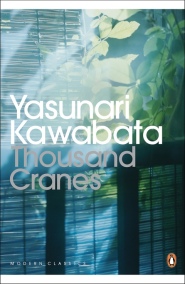Yasunari Kawabata
First Sentence: Even when he reached Kamakura and the Engakuji Temple, Kikuji did not know whether or not he would go to the tea ceremony.
I’ve never read any Yasunari Kawabata before, never even heard of him if I’m being honest, but these new Penguin covers caught my eye so I picked up a couple a while back. The Thousand Cranes is a Japanese book in every way. The language, the mannerisms, the traditional tea ceremonies, and the sheer simplicity and beauty of the writing is all apparent throughout the entire (albeit short) book, and you certainly do feel transported to a completely different place. Set in post World War II Japan the book centres on Kikuji, a young orphan who is invited to a tea ceremony by Chikako Kurimoto, one of his father’s old mistresses. At this ceremony, Kikuji is introduced to Yukiko Inamura, a girl who is ideal wife material (in Kurimoto’s eyes). Also at this ceremony however is Mrs. Ota, a tea expert and another former mistress of Kikuji’s father. It is Mrs. Ota who leaves a lasting impression on Kikuji and they end up sleeping together after the ceremony. What follows is a tragedy which Kikuji and Fumiko (Mrs. Ota’s daughter) will be trying to make sense of for a long time afterwards. On the whole this was a memorable book with a strong sense of place. You really feel like you are in an old Japanese tea house when you read things like “The shadow of young leaves fell on the paper-paneled door.” The thousand cranes in the title come from a kerchief Yukiko Inamura is wearing when she meets Kikuji at the tea ceremony. Although he does not pursue her, she does stay hidden in the recesses of his mind for some time afterwards and he thinks of her often:
The sun flowing over the branches sank into his tired eyes, and he closed them. The white cranes from the Inamura girl’s kerchief flew across the evening sun, which was still in his eyes.
In a way this book is like ‘the Inamura girl’; it may not be immediately memorable, but rather it has a lingering effect which makes you think of it at unexpected times long after you have finished reading it. Eerily atmospheric and well worth a read.
* * * *

